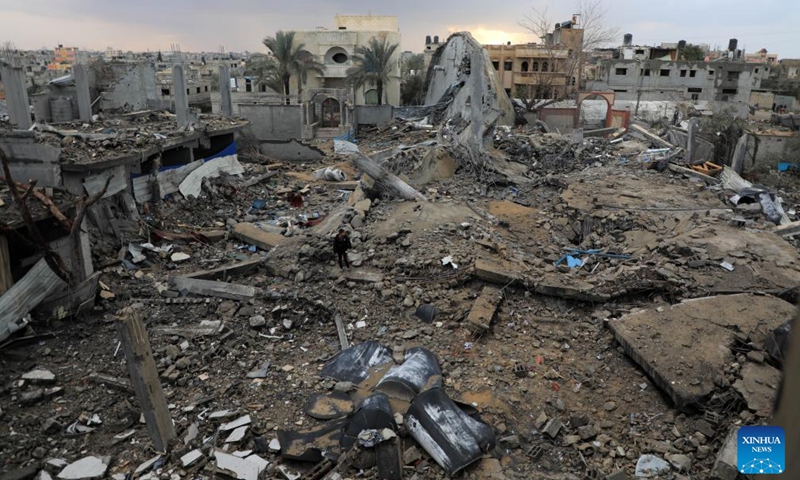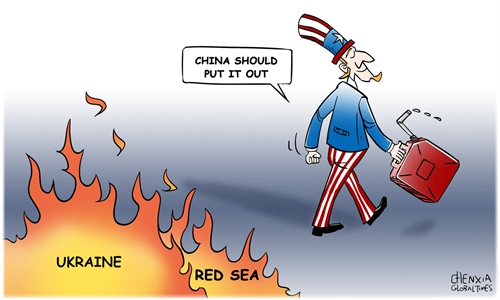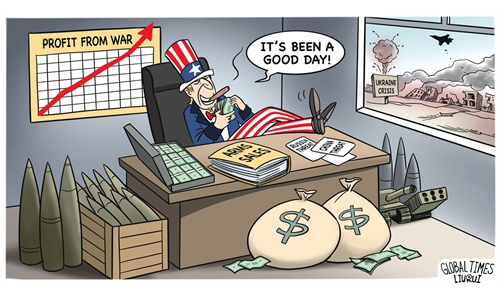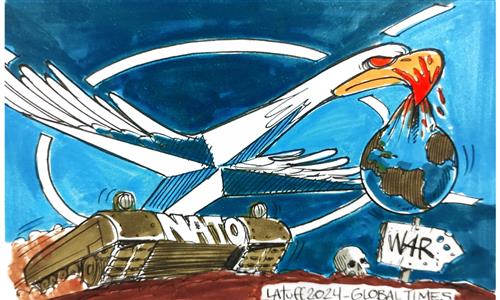
This photo taken on Jan. 27, 2024 shows the rubble in the southern Gaza Strip city of Rafah. (Photo: Xinhua)
From Russia's point of view, what is happening in the Gaza Strip is a huge tragedy. The reason for this is the paralysis of international efforts to solve the Palestine-Israel conflict. This paralysis is the result of the actions of the US and, to a lesser extent, European countries, for whom violent conflicts around the world are part of a great diplomatic game.The purpose of this game is to preserve the hegemony of the West in world affairs. Or, at the very least, to secure a better position after the complete hegemony has been destroyed by the irreversible effects of the changing balance of power on a global scale.
The price of the West's strategy in the Middle East or Ukraine is tens of thousands of human lives. Therefore, the direct impact of the crisis in the Middle East on events in Eastern Europe is determined by the ability of the US and its allies to maintain tension in several parts of the world at once, which so far, they have been able to do.
Russia's position and interests in relation to various crises are determined by the fact that Russia is an economically self-sufficient power, generously endowed with natural resources and ready to develop open trade and economic relations with the whole world. That is why, when looking at the world from Moscow's perspective, there is no point in discussing regional conflicts from the point of view of material gain.
For the past two years, Russia has been standing almost on its own against the enormous pressure from the whole of the West and against the economic war that is being waged against it. Against this backdrop, the Russian economy has shown convincing resilience and the ability to ensure an increase in the material well-being of its citizens. According to new forecasts by the International Monetary Fund, Russia's GDP growth in 2024 may reach 2.6 percent.
The opening-up of the world and the willingness of many countries to cooperate are providing access to the goods and services that the West wanted to keep out of Russia's reach. Economic relations are developing with countries in Asia - with China in first place - as well as in Africa and Latin America.
Transport along the Northern Sea Route in the Arctic reaches 36 million tons in 2023. More and more international companies will consider the possibility of using the Northern Sea Route if tensions in the Red Sea continue as a result of US and European actions. Large container shipments between the Russian and Chinese markets began along this route in the summer of 2023.
At the same time, Russia understands the threat to international security if the situation around Gaza and in the Red Sea deteriorates further. Moscow shares China's concerns, which are based on the understanding that Red Sea waters are an important international corridor for goods and energy trade.
Attacks on civilian ships are not an acceptable practice, but at the same time the actions of the US and its allies, who have been attacking sovereign Yemeni territory for several weeks now, are illegal. The only way to stop the worsening of the crisis is for all parties involved in the Gaza conflict to faithfully implement the UN Security Council and General Assembly resolutions.
When we talk about the connection between the dramatic events in the Middle East and Ukraine, it is also necessary to take into account their historical and strategic basis. The Gaza escalation and the resulting Red Sea crisis are the product of a huge complex of regional contradictions that have accumulated over recent decades. At its core is the inability to implement the UN resolution on the establishment of two states in Palestine - Jewish and Arab.
Moreover, the whole balance of power in this important region of the world has changed after the US intervention in the fate of Iraq and Syria. The regional powers - Turkey, Iran and Saudi Arabia - also have their own views on how to build peace in the Middle East. Finally, the escalation in Gaza and the Red Sea is a serious threat to the world economy. The outcome could lead to a conflict that would destabilize the entire region, which is vital to the world's energy supply.
The military confrontation in Ukraine is rooted in the post-Cold War policies of the US and NATO. Their actions, together with nationalist forces in Kiev, have created threats to Russia's security. In December 2021, Moscow offered the West a comprehensive plan to stabilize the European security system. It was rejected. Similarly, the UN Security Council's resolution 2202 of February 17, 2015, which calls for the implementation of the Minsk agreements by all parties, was rejected. Therefore, a solution in Ukraine does not require the unraveling of a complex knot of regional contradictions in which many powers are involved.
In contrast to the situation in the Middle East, peace in Ukraine can be easily achieved if the West and Kiev are willing to engage in a dialogue with Russia. This is exactly what China's peace proposals called for a year ago. So far, however, the West has not been willing to engage in such a dialogue.
Therefore, from Russia's point of view, the main link between the two crises is the involvement of the US and its allies, either directly or through their subordinates. And so far, Washington is not expected any time soon to be ready for peace. Tragically, the price of the West's failure to recognize that there is more to the world than its interests continues to be paid with the lives of many peaceful people.
The author is a program director of the Moscow-based Valdai Discussion Club. opinion@globaltimes.com.cn



